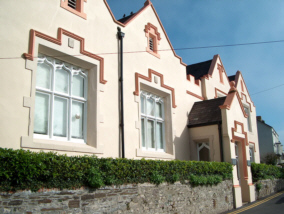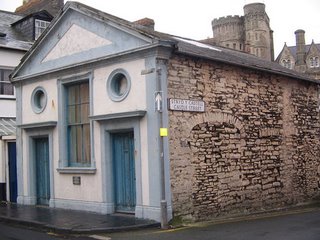D.R Davies V: Unitarianism
Old College School, Carmarthen, was devoted to training young men for the ministry. Students had to study the classics, maths, English, history, and chemistry. The master was the Rev. Joseph Parry, and the assistant Rev. J. B. Thomas. I shall leave the description of those years to David Richard Davies himself:
 "I was there in the belief that I had a vocation for the minstry, but it had no depth. I was like the seeds in the parable which, without soil, sprang up and died. In the atmosphere of the school my ideas rapidly dissolved. That is, my Pentecostalism, my Biblical literalism, just vanished."
"I was there in the belief that I had a vocation for the minstry, but it had no depth. I was like the seeds in the parable which, without soil, sprang up and died. In the atmosphere of the school my ideas rapidly dissolved. That is, my Pentecostalism, my Biblical literalism, just vanished."
There, he would have learned some of the higher criticism, in a highly scholastic atmosphere. More, he had been influenced by a student at the Presbyterian (Unitarian) College on the parade (pictured). This building was the successor to the college that had educated Howell Harris and Williams, Pantycelyn, and was now the centre for Unitarianism in Wales. In a heartening development, the College Buildings were puchased in 1980 for thuse use of Carmarthen Evangelical Church.
 "I was there in the belief that I had a vocation for the minstry, but it had no depth. I was like the seeds in the parable which, without soil, sprang up and died. In the atmosphere of the school my ideas rapidly dissolved. That is, my Pentecostalism, my Biblical literalism, just vanished."
"I was there in the belief that I had a vocation for the minstry, but it had no depth. I was like the seeds in the parable which, without soil, sprang up and died. In the atmosphere of the school my ideas rapidly dissolved. That is, my Pentecostalism, my Biblical literalism, just vanished."There, he would have learned some of the higher criticism, in a highly scholastic atmosphere. More, he had been influenced by a student at the Presbyterian (Unitarian) College on the parade (pictured). This building was the successor to the college that had educated Howell Harris and Williams, Pantycelyn, and was now the centre for Unitarianism in Wales. In a heartening development, the College Buildings were puchased in 1980 for thuse use of Carmarthen Evangelical Church.
Meeting a more well-read, older man who espoused Unitarian principles was ultimately fatal for Davies' profession of faith. Unable to beat the man in argument, and formerly convinced of the evident truth of his beliefs, Davies soon moved into lodgings with this Unitarian, and professed Unitarianism himself, much to the distress of his parents:
"To the passionate Protestantism of South Wales Nonconformity in those days, Unitarianism was equivalent to leprosy. Unitarians were a race apart. In the mining valleys they hardly existed. They were confined to the county of Cardigan and a few places in Carmarthenshire, which together were known as the black spot of Wales. To have a son a Unitarian was, therefore, not only a disaster, but a shameful disaster."
While continuing his studies at Old College School, Davies met with Professor Moore, who taught New Testament Greek. Through him, Davies became acquainted with the work of the foremost Unitarian scholars, including the works of James Martineau, especially his A Study of Religion. His studies of the Gospels were informed by the works of Estlin Carpenter and Dr. Drummond. Once a week, the erring student would meet with Professor Moore to discuss his extra-curricular studies. In this time, D. R. Davies learned Church history, as well as associated matters. And, strange to say, he acquired his first pastorate.
"Some months afterwards I was invited to preach at the Unitarian Church, Aberystwyth. The upshot was that I was asked to become a student minister of the Church. Now I can see the absurdity of it, that a youth of seventeen should minister to a congregation of people."
The Church (pictured), was in New Street, behind the college. Fomerly a coach-house, Methodist Chapel and bookshop, it was a small building, and the congregation about thirty in size. The building closed in 1976 and is currently rotting quietly [correction: I discover that the building, although listed as having closed in the town history, is still being used for Unitarian meetings, according to their website. That said, it is still in an extremely poor condition].
Davies preached two sermons a week, which he later called 'appalling things', more from the presumption of youth than the content, which he could not recall. However, in becoming a student minister, he was able to support himself, as his parents had cut off supplies when they found he intended to train for the Unitarian ministry.
At Aberystwyth, D. R. Davies read avidly, mostly of philosophy, reading Aristotle and Plato, as well as Locke and Hume. These books produced doubts about the human condition in the mind of the student minister. In addition, he was preparing for the entrance exam for Summerville Unitarian College, Manchester.
In September, 1907, D. R. Davies left his tiny flock at Aberystwyth for Manchester. He registered at the University for his course. Once more, he was training for the ministry, although now at University level, and as a Unitarian. But this was not to last, as we shall, God willing, discover next time.
Labels: D. R. Davies


0 Comments:
Post a Comment
<< Home